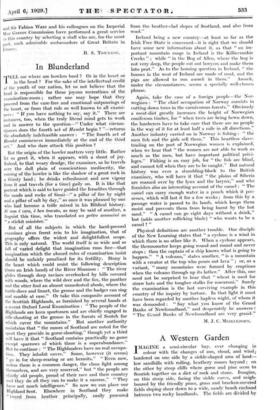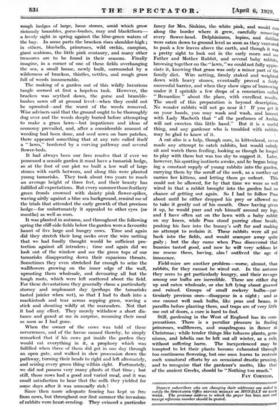A Western Garden I MAGINE a semi-circular bay, ever changing in
colour with the changes. of sun, cloud, and wind; bordered on one side by a sickle-shaped arm of land— low sandhills with rolling, heathery moors beyond ; on the other by steep eh& where gorse and pine seem to flourish_ together on a diet of rock and stone. Imagine, on this steep. side, facing the sickle curve, and neigh- boured by the friendly pines, grass and bracken-covered fields sloping sheer down to ,a wide, sandy beach enchised between two rocky headlands. The fields are divided by rough hedges of large, loose stones, amid which grow riotously brambles, gorse-bushes, may and blackthorn- s lovely sight in spring against the blue-green waters of the bay. In some parts the bracken rises shoulder-high ; in others, bluebells, primroses, wild orchis, campion, giant scabious, the little pink centaury, and many other treasures are to be found in their seasons. Finally imagine, in a corner of one of these fields overhanging the sea, a small house, newly built, surrounded by a wilderness of bracken, thistles, nettles, and rough grass full of weeds innumerable.
The making of a garden out of this wildly luxurious tangle seemed at first a hopeless task. However, the bracken was scythed down, the gorse and bramble- bushes sawn off at ground level—when they could not be uprooted—and the worst of the weeds removed. Wise advisers said that the ground ought to be thoroughly dug over and the weeds deeply buried before attempting to make a grass lawn—but impatience and ideas of economy prevailed, and, after a considerable amount of weeding had been done, and seed sown on bare patches, there appeared something that at any rate called itself a " lawn," bordered by a curving pathway and several flower-beds.
It had always been our firm resolve that if ever we possessed a seaside garden it must have a tamarisk hedge, so at the foot of our plot we built a low wall of large stones with earth between, and along this were planted young tamarisks. They took about two years to reach an average height of three feet, and their beauty has fulfilled all expectations. But every slimmer those feathery green fronds crowned with dainty pink flower-spikes, waving airily against a blue sea background, remind me of the trials that attended the early growth of that precious hedge—for unfortunately it appealed to other eyes (or mouths) as well as ours.
It was planted in autumn, and throughout the following spring the cliff-side fields below the garden were a favourite haunt of five large and hungry cows. Time and again did they stretch their long necks over the wire netting that we had fondly thought would be sufficient pro- tection against all intruders ; time and again did we look out of the window and see the green tops of our tamarisks disappearing down their capacious throats. Sometimes they even stretched far enough to seize the wallflowers growing on the inner edge of the wall, uprooting them wholesale, and devouring all but the tough roots, which were left scattered about the field. For these devastations they generally chose a particularly stormy and unpleasant day (perhaps the tamarisks tasted juicier when wet), so that I had to dash into a mackintosh and tear across sopping grass, waving a stick and shouting wildly at the marauders. Not that it had any effect. They merely withdrew a short dis- tance and gazed at me in surprise, resuming their meal as soon as I had gone.
When the owner of the cows was told of these occurrences, and of the havoc caused thereby, he simply remarked that if his cows got inside the garden they would eat everything in it, a prophecy which was fulfilled when three of them did get in one day through an open gate, and walked in slow procession down the pathway, turning their heads to right and left alternately, and seizing every green thing within sight. Fortunately, we did not possess very many plants at that time ; but still, those cows had a good and varied meal, and it was small satisfaction to hear that the milk they yielded for some days after it was unusually rich !
Since then more adequate fencing has kept us free from cows, but throughout our first summer the invasions of rabbits were heart-rending. They evinced a particular fancy for Mrs. Sinkins, the white pink, and would run along the border where it grew, carefully removing every flower-head. Delphiniums, lupins, and dahlias were eaten down to ground level as soon as they ventured to push a few leaves above the earth, and though it was a pretty sight to look out in the early morn and see Father and Mother Rabbit, and several baby rabbits, browsing together on the " lawn," we could not fully appre, ciate it, knowing that grass was only a minor part of the family diet. Wire netting, firmly staked and weighted down with heaVy stones, eventually proved a fairly successful barrier, and when they show signs of burrowing under it I sprinkle a few drops of a concoction called " Renardine " about the place, with excellent results. The smell of this preparation is beyond description. No wonder rabbits will not go near it ! If you get it on your hands, you may wash and wash, and lament with Lady Macbeth that " all the perfumes of Arabia will not sweeten this little hand." But it is a useful thing, and any gardener who is troubled with rabbits may be glad to know of it.
A cat also is a help, though ours, in kittenhood, never made any attempt to catch rabbits„ but would calmly sit and watch them feeding, looking as though he longed to play with them but was too shy to suggest it. Later, however, his sporting instincts awoke, and he began bring- ing a constant supply of young rabbits into the garden, carrying them by the scruff of the neck, as a mother cat carries her kittens, and letting them go unhurt. This could not be allowed, for by that time we were so well wired in that a rabbit brought into the garden had no chance of getting out again. So I had to follow Puss about until he either dropped his prey or allowed me to take it gently out of his mouth. Once having given it up, he would purr and rub himself around my legs, and I have often sat on the lawn with a baby rabbit on my knees, while Puss stood purring close beside, pushing his face into the bunny's soft fur and making no attempt to reclaim it. These rabbits were all put back into the fields, and would scamper away quite gaily ; but the day came when Puss discovered that bunnies tasted good, and now he will very seldom let me rescue them, having, alas ! outlived the age of innocence.
Field-mice are another problem—worse, almost, than rabbits, for they cannot be wired out. In the autumn they seem to get particularly hungry, and their ravages among our bulbs are incredible. These are either dug up and eaten wholesale, or else left Tying about gnawed and ruined. Groups of small rockery bulbs—par- ticularly precious ones disappear in a night ; and as one cannot well soak bulbs, like peas and beans, in paraffin before planting them, and traps are of very little use out of doors, a cure is hard to find.
Still, gardening in the West of England has its com- pensations. There is a peculiar pleasure in finding primroses, wallflowers, and snapdragons in flower at Christmas; while tender things like tobacco plants, gera- niums, and lobelia can be left out all winter, as a rule, without suffering harm. The inexperienced may be tempted to let their plants become exhausted through too continuous flowering, but one soon learns to restrain such unnatural efforts by an occasional drastic pruning, and to recognize that the gardener's motto, like that of the ancient Greeks, should be "Nothing too much."
FAT CORNISH.







































 Previous page
Previous page